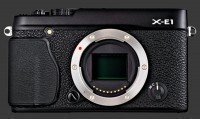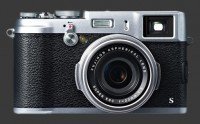Fujifilm X100S Review
Fujifilm X100S Performance - How well does it take pictures?
The Fuji X100S may look a lot like its predecessor yet is completely different inside. Already the X100 delivers the best image-quality in its class, so the X100S has a high bar to take on. The new X-Trans II CMOS sensor offers 25% more resolution, twice the maximum light sensitivity and incorporates Phase-Detect AF sensors.

The 16 megapixels sensor much finer details than the X100 thanks to the increase in resolution and the lack of an anti-alias filter. Image-quality is extremely high and competes with the best APS-C DSLR. Noise is extremely low and nearly invisible through ISO 3200 while retaining details exceptionally well.
Images captured from ISO 100 to 6400 are usable up to large print sizes with ISO 6400 showing a tiny amount of noise when viewed at 100%. Expanded sensitivities are only slightly more noise and remain very easily usable for mid-size prints. This is an excellent performance by any measure.
Dynamic-range is superb, although one can easily notice that Fuji uses an entirely different approach. Maximum dynamic-range is achievable between 800 and 6400 where it is above that of most digital cameras. At ISO 400, the dynamic-range is still impressive and at ISO 200 it is comparable to other APS-C cameras. ISO 100, being a simulated sensitivity, clips highlights noticeably more, so there is little reason to use this sensitivity, particularly when considering the X100S has a built-in 3-stop ND-filter.
Rendition of JPEG images is highly influenced by image parameters. For best results, set Sharpness set to +1 and use Provia with Color, Highlight Tone, Shadow Tone and Noise Reduction set to -1. Sharpness settings are gentle and parameter steps are fine, so there is limited latitude and getting way-off results is not easy.

The Fujinon 23mm F/2 lens is a superb achievement. It is perfectly sharp from F/2 except at the extreme corners of images. The corners sharpen nicely at each stop down from the maximum with the sweet-spot around F/5.6. There is no noticeable distortion or vignetting either. Purple fringing is a rarely for this lens, appearing only when shooting directly at strong light sources.
Color accuracy is good when using Provia film-simulation with color dialed down one step. Default sharpness setting is much better than most cameras. Pushing it up one step makes images look crisper without artifacts. Those appear at the maximum setting though.
Automatic while-balance is good but not perfect. In typical outdoor conditions, it generally does very well. In the presence of artificial light, mostly tungsten, it leaves a noticeable yellowish cast. Switching to a white-balance preset corrects this in most situations. Custom white-balance works as expected.

Metering is surprisingly reliable, mostly because the preview is not always exposure-priority. This digital camera copes well and generally avoids over-exposure except for particularly dark scenes. Under-exposure is extremely rare. Highlight burn out faster in the EVF/LCD than reality, so the camera can trick the user into under-exposing.
Speed of the Fuji X100S is quite good and notably improved over the X100, particularly when it comes to AF. The hybrid autofocus works very well and is capable of locking quickly, which it does when light is good. In low-light, autofocus slows down considerably. The camera can focus in less than ¼s but often takes 1s or more too.
The performance of the Fuji X100S is characterized by the following numbers:
- Power On: 1s, very good.
- Power to first shot: 1½s, excellent.
- Autofocus: ¼s to 1s. Very good in moderate light. Better than average for a fixed-lens camera in low-light.
- Shutter-Lag: Instant with ½s black-out. Good for a fixed-lens camera.
- Shot-to-shot: Just under ¾s, good for a fixed-lens camera.
- Playback: Just above 1s to enter or exit. Average.
- Power-Off: 1s, good.
When compared to other fixed-lens cameras, these numbers are very impressive. These however lag behind DSLRs and certain mirrorless cameras which fall below the price of the X100S.
Continuous shooting offers both 6 and 3 FPS. The buffer accommodates up to 28 JPEG files which is almost 5 seconds of burst. RAW files are much heavier with only room for up to 8. A fast memory-card makes a notable difference when waiting for the write to finish. The one feature that is exceptionally fast is the Motion Panorama mode which shows the results shortly after completing the pan. Bracketing is speedy too. AEB and Dynamic-Range bracketing are performed as real brackets but ISO and FSB are both performed virtually, so one shot is taken but it is saved three times with different settings. Surprisingly this includes ISO.
Battery life is quoted at 300 shots according to the CIPA standard which requires 50% flash use. This is below average for a modern camera. Given the camera's exceptional ISO performance though, you can easily stretch this by using the flash less often. It does consume an unusually high amount of power in sleep mode, so turn the camera off when not needed. It powers on quickly anyway.
Fujifilm X100S Conclusion
The Fuji X100S produces superb image-quality, matching that of DSLRs and fixed-lens cameras which APS-C sensors. Noise levels are extremely low and fine-details are rendered well up to maximum standard ISO. The lack of an anti-alias filter gives it more crisp output than its predecessor and most digital cameras.
This camera does will in other aspect of image-quality too, with great dynamic-range, good exposure, pleasing color and generally accurate white-balance. The lens is exceptionally sharp with virtually no distortion or sign of vignetting.
Having access to such an excellent performance in a compact camera, is probably reason enough to want one and overlook its share of oddities. Despite an analog design and having plenty of external controls, ergonomics of the X100S are far from perfect. Still, one gets used to some of those quirks after a while. The unique built-in hybrid viewfinder allows for a greater sense of closeness to the scene. Its 2.4 megapixels EVF mode is superb and pleasant to use.
The speed of the Fuji X100S is impressive and notably improved from its predecessor. Autofocus in particular is very fast in good to moderate light. It slows down considerably when light levels drop but still compares to most fixed lens cameras.
There are reasons for passing on the X100S, even if you can afford one. The obviously one is the fixed 23mm lens. If it does not fit the bill, it just does not. The second is competition, for the price of this camera, one can get a much more flexible mirrorless camera, including one or more lenses. The Fujifilm X-E1
Fujifilm X-E1 which uses a very similar sensor but without the Phase-Detect AF, goes for less, including either a zoom or prime lens. It also features a 2.4 MP EVF.
The Fuji X100S proves to be an excellent yet pricey camera. Its unique technologies like the X-Trans II CMOS sensor and hybrid viewfinder may just be what some are looking for. Its bright F/2 prime lens with built-in leaf-shutter also delivers quality which is unequalled in this size. The X100S shows great appeal and can satisfy those who are comfortable with the constraints of a single prime lens.
 |
Please Support Neocamera
All information on Neocamera is provided free of charge yet running this website is a huge endeavor. Purchases made via affiliate links found throughout the site help keep it running and up-to-date. There is no additional cost to you, so please consider buying via these links to our affilates:
If you found any information on this site valuable and did not purchase via our affiliate links, please considering donating via PayPal:
Any amount will be greatly appreaciated. Thank you for your support!
Fujifilm X100S Highlights

Sensor-Size: 24 x 16mm

Actual size when viewed at 100 DPI
| 16 Megapixels Fixed Lens | ISO 200-25600 |
| Fixed 35mm lens | Shutter 1/4000-30s |
| 0.48" Hybrid EVF 2.4 Megapixels (0.50X) | Full manual controls, including Manual Focus |
| Automatic Eye-Start sensor | Custom white-balance with 2 axis fine-tuning |
| 1 Axis Digital Level | Spot-Metering |
| 6 FPS Drive, 29 Images | Hot-Shoe |
| 1920x1080 @ 60 FPS Video Recording | Stereo audio input |
| 2.8" LCD 460K Pixels | Lithium-Ion Battery |
| Secure Digital Extended Capacity |
Updates
2024.11.18

Best 2024 Photography Gifts for Every Budget
Great gifts for photographers and photo enthusiasts selected for every budget among the best products of 2024.
2024.08.07

Eye Protection Tips for Professional Photographers
The four main considerations for professional photographers regarding eyewear.
2024.07.14

Fujifilm X100VI Review
Flagship fixed-lens compact digital camera with a 40 MP sensor and Image-Stabilization, a first for the series. Retro design featuring dual control-dials, plus direct ISO, Shutter-Speed and EC dials. Its hybrid viewfinder can switch between EVF and OVF mode.
2024.05.09

Fujifilm GFX100 II Review
Flagship 102 Megapixels Medium-Format Mirrorless Digital Camera with 8-Stop 5-Axis IBIS, 8 FPS Drive, 8K Video and 400 MP Super-Resolution capture in a weatherproof and freezeproof body with dual control-dials and dual memory-card slots.
2024.04.03

Fujifilm X-T5 Review
Newest Fujifilm flagship boasting a 40 MP APS-C sensor, 5-axis IBIS with 7-stop efficiency, 15 FPS continuous drive, 6.2K Video capture, dual control-dials and dual SDXC UHS-II slots in a sturdy weatherproof and freezeproof body.
2023.11.20

Best Digital Cameras of 2023
Find out which are the Best Digital Cameras of 2023. All the new Mirrorless Digital Cameras from entry-level to high-end professional.
2023.07.10

Fujifilm X-H2 Review
40 Megapixels APS-C Hybrid Mirrorless Digital Camera with 7-stop IBIS. Fastest shutter ever and 8K video capture. Large builtin EVF with 0.8X magnification and 5.8 MP, plus an Eye-Start Sensor. Packed with features and large number of controls in a weatherproof and freezeproof body.
2023.05.07

Sony FE 20-70mm F/4G Review
Review of the unique Sony FE 20-70mm F/4G lens. The optical zoom of this lens spans ultra-wide-angle and medium focal-length coverage, making it one of the most versatile Full-Frame lenses on the market.
2023.01.15

Huion Inspiroy Dial 2 Review
Review of the Huion Inspiroy Dial 2 tablet, a medium sized drawing surface with dual dials and customizable buttons. Connects via USB-C or Bluetooth 5.0 with Windows, Linux and Android support.
2022.12.08

How to Pack for a Photo Trip
Find out how to pack for a travel photography trip, carry your gear safely while meeting airline regulations.
2022.11.13

Best Digital Cameras of 2022
The best digital cameras of 2022. A short list of the most outstanding models in their respective categories. Choose one for yourself or as a gift.
2022.09.21

Pentax DA* 60-250mm F/4 SDM Review
Review of the Pentax DA* 60-250mm F/4 SDM, the constant-aperture telephoto zoom with the highest zoom-ratio on the market.












